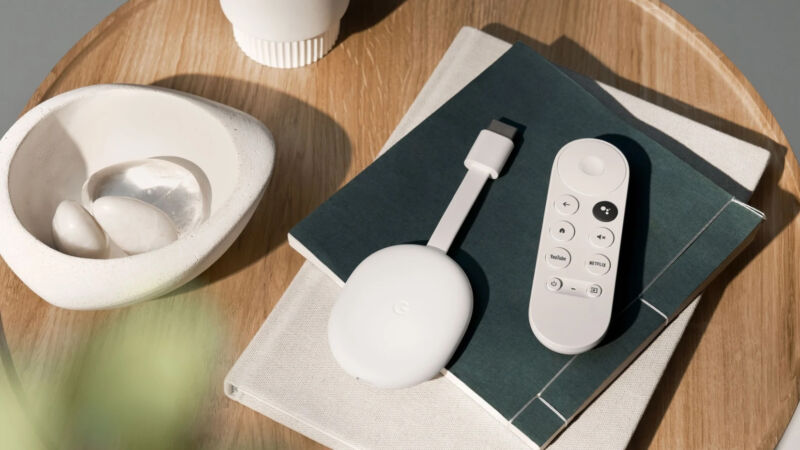[ad_1]

Google Chromecast infringed upon three patents of Touchstream Technologies, Inc. and should pay $338.7 million in damages, a Western District of Texas jury decided on Friday, as reported by Law360.
The verdict [PDF] shows the jury agreeing with Touchstream’s allegations that Google violated patents 8,356,251, 8,782,528, and 8,904,289 (Touchstream Technologies Inc. v. Google LLC, case number 6:21-cv-00569 in the U.S. District Court for the Western District of Texas).
The ruling comes after Touchstream filed a complaint in June 2021 claiming that it met with Google in December 2011 and was told that the tech giant wasn’t interested in partnering with it in February 2012. Google then released Chromecast in 2013. The complaint points to the first Chromecast and the second and third generations, Chromecast Ultra and Chromecast with Google TV, as well as other Chromecast-integrated products, as infringements of Touchstream patents.
The complaint claims that Touchstream founder David Strober in “as early as mid-2010” saw demand for the ability to move videos typically viewed on small screens, like a smartphone display, to a larger screen, like a TV or monitor. Strober eventually sought to use a device, like a smartphone, “to cause a video to play on a second screen, even if that video resided elsewhere (like the public Internet),” the complaint says, adding that Stober had a “working prototype” by the end of 2010 and his first patent application filed by April 2011.
All three of the Touchstream patents in question are titled “Play control of content on a display device” and detail “a system for presenting and controlling content on a display device” that uses “a network, a server system coupled to the network and comprising one or more servers, a display device coupled to the network and having a display, and a personal computing device operable to transmit a first message according to a specified format over the network to the server system.”
The patents’ abstracts continue: “The server system stores an association between the personal computing device and the display device. The first message identifies user-selected content and a media player to play the content. The server system is operable, in response to receiving the first message from the personal computing device, to provide to the display device a second message identifying the user-selected content and the media player to play the content. In response to receiving the second message, the display device is operable to obtain a first media player needed to play the content, to load the media player and to present the content on the display.”
Google denied infringing on Touchstream’s patents and has claimed the patents are invalid, based on the principle of obviousness, which argues that inventions that are apparent to the general public due to previous inventions can’t be patented.
In court filings, Google states that the patents in question are “hardly foundational and do not cover every method of selecting content on a personal device and watching it on another screen,” as Law360 noted.
Google also reportedly argued that Chromecast differs from the technologies in Touchstream’s patents because Chromecast uses a server system and display device, while Touchstream’s patents detail separate entities for the server system and display.
Google has also argued that Touchstream is only a licensing entity with no products or customers and therefore has asked the court not to ban sales of Chromecast. Touchstream’s “only business is to attempt to monetize patents. If Touchstream receives damages, it will have fulfilled its only business purpose,” Google said, as quoted by Law360.
Google declined to comment further on the statement on what the legislation means for Chromecast products to Ars Technica.
Google to appeal
In a statement to Ars, Google spokesperson José Castañeda said:
We strongly disagree with the verdict and will appeal. We have always developed technology independently and competed on the merits of our ideas, and will continue to defend ourselves against these meritless claims.
Google is challenging the validity of the three Touchstream patents at the Patent Trial and Appeal Board, with rulings expected by October, Law360 noted.
Ars reached out to lawyers for Touchstream at Shook, Hardy & Bacon LLP about the case and Google’s claims that Touchstream’s only interest is in patents. Ryan Dykal, an IP partner working on the case, said:
Touchstream filed for patent protection and spent a year developing its technology before meeting with Google under the guise of an NDA. The trial record shows that despite the protections from the NDA and the patent filings, within weeks of their meeting Google began secretly building [its] infringing casting technology. After Google flooded the market with 140 million infringing devices–often sold at or below cost—Touchstream continued building its business until it was forced to enforce its rights starting in 2017. The jury was presented with all of the facts and concluded that Touchstream’s patents are valid and Google infringed.
Google declined to comment on Touchstream’s statement.
Touchstream also has patent infringement lawsuits against Altice, Charter, and Comcast, Law360 noted. Touchstream claims that the companies’ apps and/or set-top box technologies violate similar patents, including the aforementioned 8,356,251 patent that Touchstream accused Google of infringing.
[ad_2]
Source link

